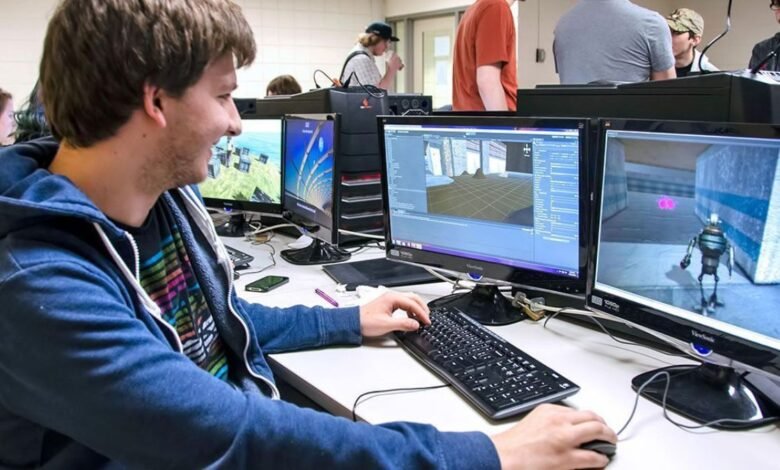How PC Game Developers are Pushing the Boundaries of Creativity

PC game developers have consistently redefined the landscape of entertainment and technology, merging creativity and technical prowess to craft experiences that captivate millions. In recent years, the gaming industry has grown beyond mere leisure, influencing various fields such as education, medicine, and even social interactions. As the industry evolves, developers are pushing the boundaries of what is possible, both in terms of artistic expression and technological innovation. This article explores how PC game developers are stretching the limits of creativity and shaping the future of gaming.
The Evolution of Game Design: A Canvas for Creativity
The process of creating a PC game is not merely technical; it is a profoundly creative endeavor. Developers must consider the story, characters, settings, and even the subtle nuances of player interaction. In the past, games were limited by the technological constraints of the time. Early PC games, while revolutionary, often focused on straightforward gameplay and pixelated graphics. However, as technology advanced, so too did the opportunities for creative expression.
Modern PC game developers now have access to powerful tools, such as advanced game engines, 3D modeling software, and artificial intelligence, which allow them to design rich, immersive worlds. These technological advancements provide developers with a broader creative canvas. For instance, games like “The Witcher 3” and “Cyberpunk 2077” from CD Projekt Red showcase the detailed environments, intricate characters, and complex storytelling made possible by the latest in development technologies.
Moreover, the shift towards open-world games and sandbox environments has empowered developers to think more freely about how they design interactions between players and the game world. Instead of linear stories, many developers now focus on creating games where players can carve out their own paths, fostering creativity not only within the developers but also among the players themselves.
Artistic Storytelling and Emotional Engagement
At the heart of many modern PC games is a narrative, often rich in lore, characters, and emotion. Developers are no longer content with simply delivering an entertaining experience; they strive to tell stories that evoke a wide range of emotions in players. Whether it’s the heart-pounding thrill of a battle or the emotional pull of a character’s story arc, narrative-driven games have become a hallmark of creative excellence.
One area where developers have pushed creative boundaries is through deep, multifaceted storytelling. The rise of “choice-driven” games like those from Telltale Games, Quantic Dream, and Obsidian Entertainment has allowed developers to weave intricate narratives where the player’s decisions affect the game’s outcome. These games encourage players to connect with the characters on a deeper level, giving them agency over the story’s direction.
Titles like “Life is Strange” and “The Last of Us” blur the line between game and cinematic storytelling, offering rich emotional experiences that rival those of films. This is a testament to how far PC game developers have come in pushing the boundaries of what a game can achieve emotionally. By focusing on complex themes such as loss, love, and survival, they tap into the human experience, creating games that resonate on a deeply personal level.
Technological Advancements Fueling Creative Freedom
Innovation in technology has been instrumental in enabling PC game developers to push creative boundaries. As hardware capabilities increase, so too does the ability to implement more complex game mechanics, higher fidelity graphics, and expansive worlds. Developers are constantly testing the limits of these technologies to create unique experiences that challenge players’ expectations.
One of the most significant technological breakthroughs in recent years is real-time ray tracing, which allows for more realistic lighting, reflections, and shadows in games. This technology, made popular by NVIDIA’s RTX graphics cards, gives developers the ability to create visually stunning environments that feel lifelike. Titles like “Control” and “Metro Exodus” showcase how these advancements enhance immersion, allowing developers to craft breathtakingly realistic worlds.
In addition to graphics, artificial intelligence (AI) is also a key area where developers are innovating. AI-controlled characters, or NPCs, are becoming increasingly sophisticated, behaving more like real humans and adding depth to the game world. Games like “Red Dead Redemption 2” demonstrate how advanced AI can make virtual worlds feel alive, with NPCs following daily routines, reacting to the player’s actions, and interacting with each other in meaningful ways.
Expanding the Scope of Player Interaction
As games become more complex, developers are exploring new ways to involve players in the creative process. The concept of “modding” – where players modify games by adding their own content – has gained significant traction in the PC gaming community. Many PC games are designed with modding in mind, allowing players to alter game mechanics, create new characters, or even build entirely new game worlds. This symbiotic relationship between developers and players fosters an environment where creativity flourishes.
Games like “Skyrim” and “Minecraft” have thriving modding communities, with players contributing thousands of new pieces of content, from enhanced graphics to completely new gameplay systems. PC game developers have embraced this trend by providing tools and support for modding, further blurring the lines between developer and player. The creativity of the gaming community enriches the experience for everyone, transforming games into collaborative works of art.
Additionally, the rise of multiplayer and online games has led to innovations in player interaction. Developers are finding creative ways to build social experiences into their games, allowing players to form communities, collaborate, and compete on a global scale. Games like “Fortnite” and “World of Warcraft” have evolved beyond traditional gameplay, becoming platforms for social interaction and even live events like concerts and in-game performances. This shift towards integrating social elements into gameplay demonstrates how developers are thinking creatively about the role of games in players’ lives.
Virtual Reality and the Future of Gaming
Perhaps one of the most exciting frontiers for PC game developers is virtual reality (VR). VR technology offers entirely new opportunities for creativity, immersing players in a 360-degree virtual world where they can interact with their environment in unprecedented ways. While still in its early stages, VR is rapidly gaining traction, with developers creating innovative games that fully utilize the potential of this new medium.
Developers such as Valve, with their hit game “Half-Life: Alyx,” are at the forefront of this movement, crafting experiences that redefine how players interact with the game world. VR challenges developers to think differently about gameplay mechanics, as traditional control schemes don’t apply in a fully immersive environment. This demands a new level of creativity, as developers must reimagine everything from movement to object interaction to storytelling.
As VR technology improves, the creative possibilities for PC game developers are virtually limitless. From immersive storytelling to new forms of gameplay, VR promises to push the boundaries of what’s possible in the gaming world, offering an entirely new platform for creative expression.
Conclusion: A Bold Future for PC Game Development
PC game developers continue to push the boundaries of creativity, driven by advancements in technology and a desire to craft meaningful, immersive experiences. Whether through artistic storytelling, technological innovation, or player-driven creativity, the future of PC game development is bright. Developers are constantly challenging themselves and the industry, ensuring that PC games remain at the forefront of entertainment and creative expression.
As they explore new frontiers like virtual reality, artificial intelligence, and player interactivity, PC game developers are not only shaping the future of gaming but also expanding the limits of what games can achieve as an art form. The gaming world is evolving, and with it, the creative boundaries that once constrained developers are being shattered, paving the way for even more groundbreaking innovations.



